Unit 2 How often do you exercise? 重点知识汇总及练习(含答案)人教版八年级英语上册
文档属性
| 名称 | Unit 2 How often do you exercise? 重点知识汇总及练习(含答案)人教版八年级英语上册 | 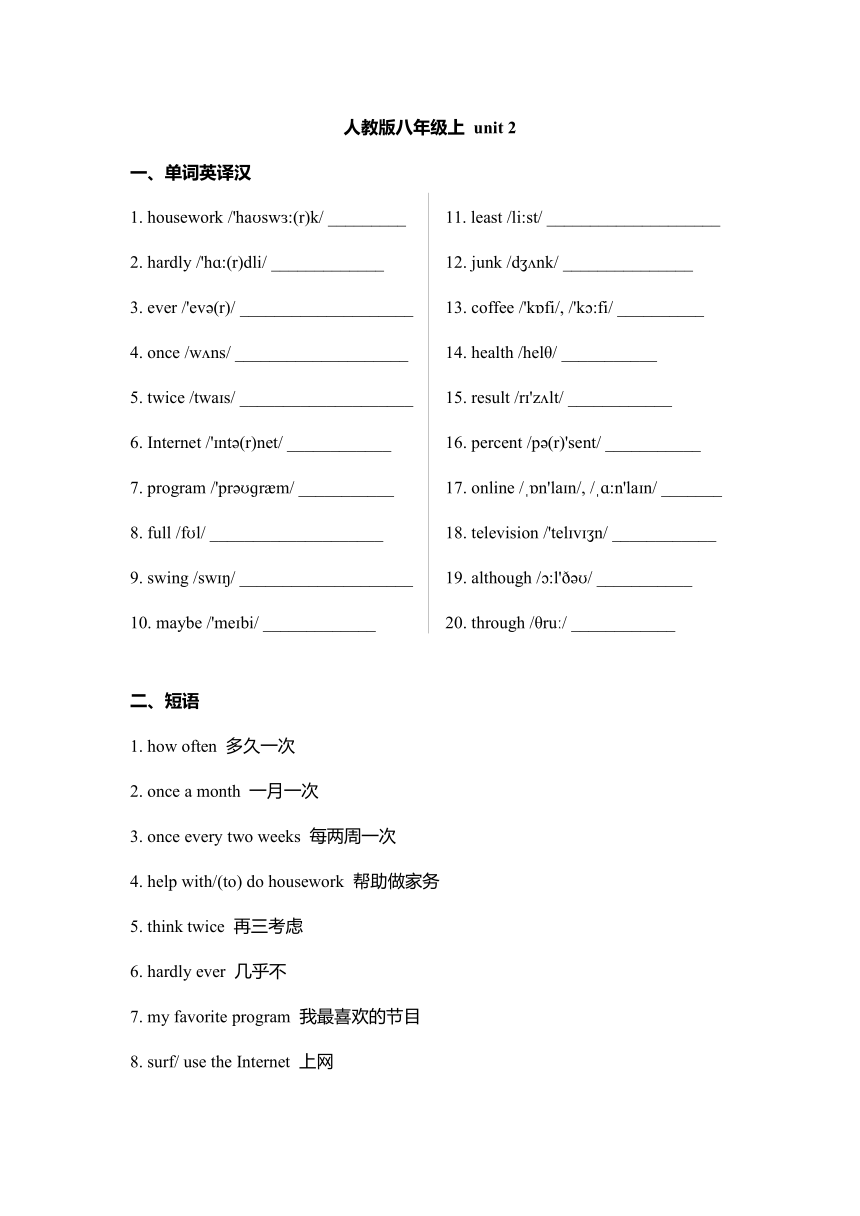 | |
| 格式 | docx | ||
| 文件大小 | 28.3KB | ||
| 资源类型 | 教案 | ||
| 版本资源 | 人教新目标(Go for it)版 | ||
| 科目 | 英语 | ||
| 更新时间 | 2024-07-01 19:29:04 | ||
图片预览

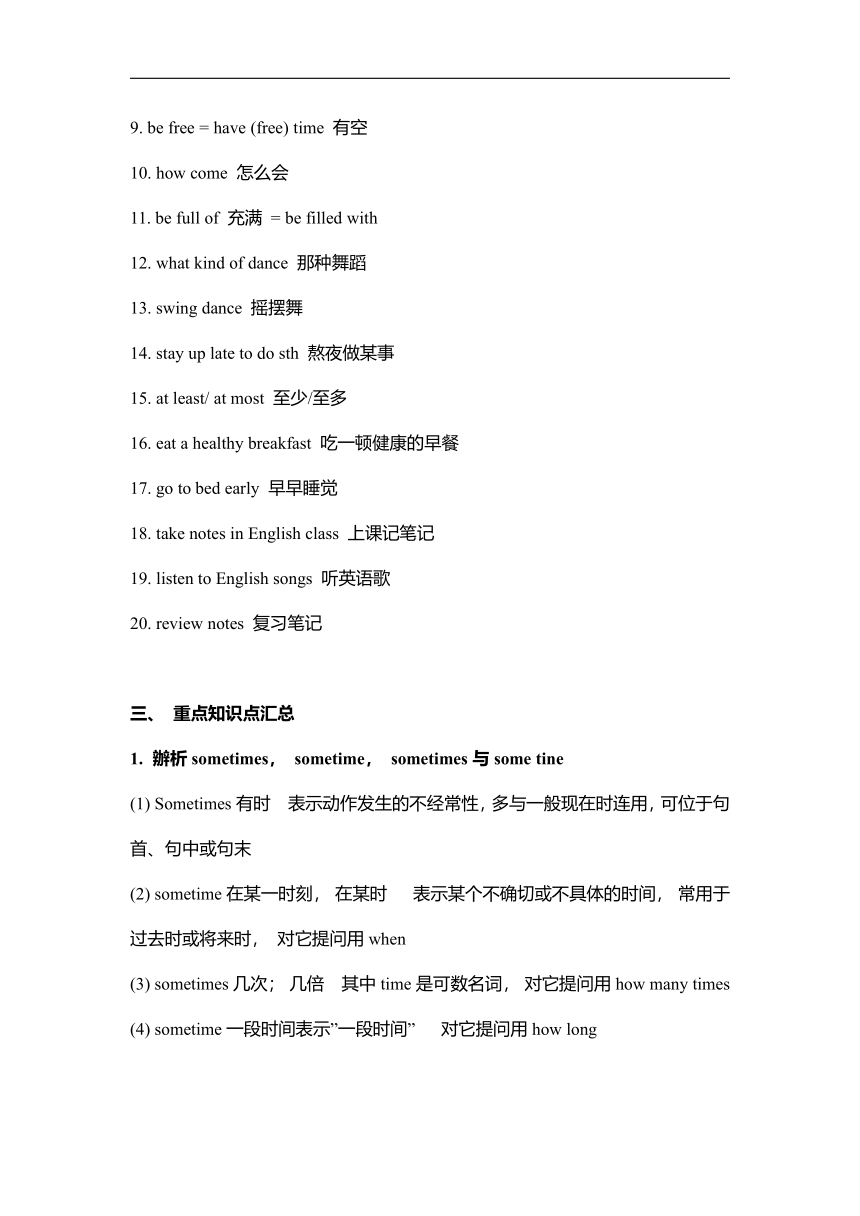
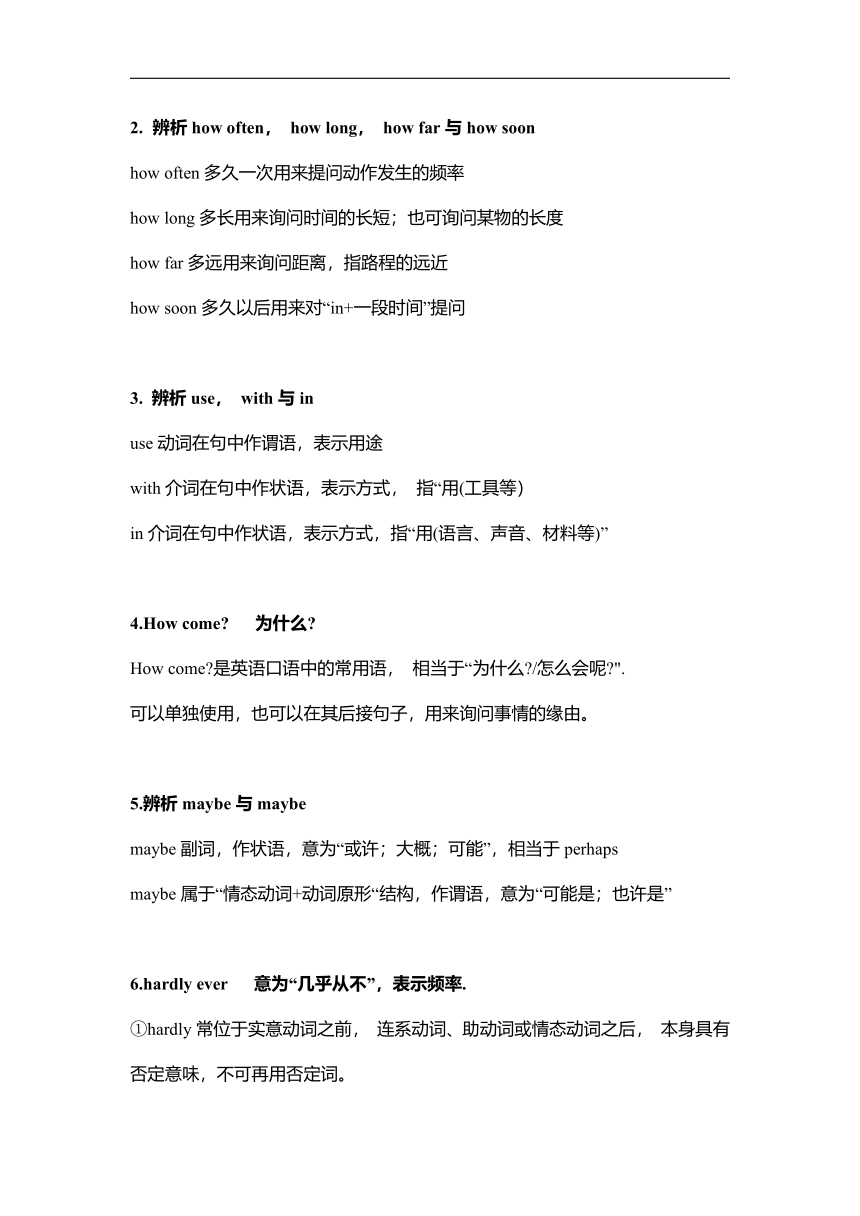
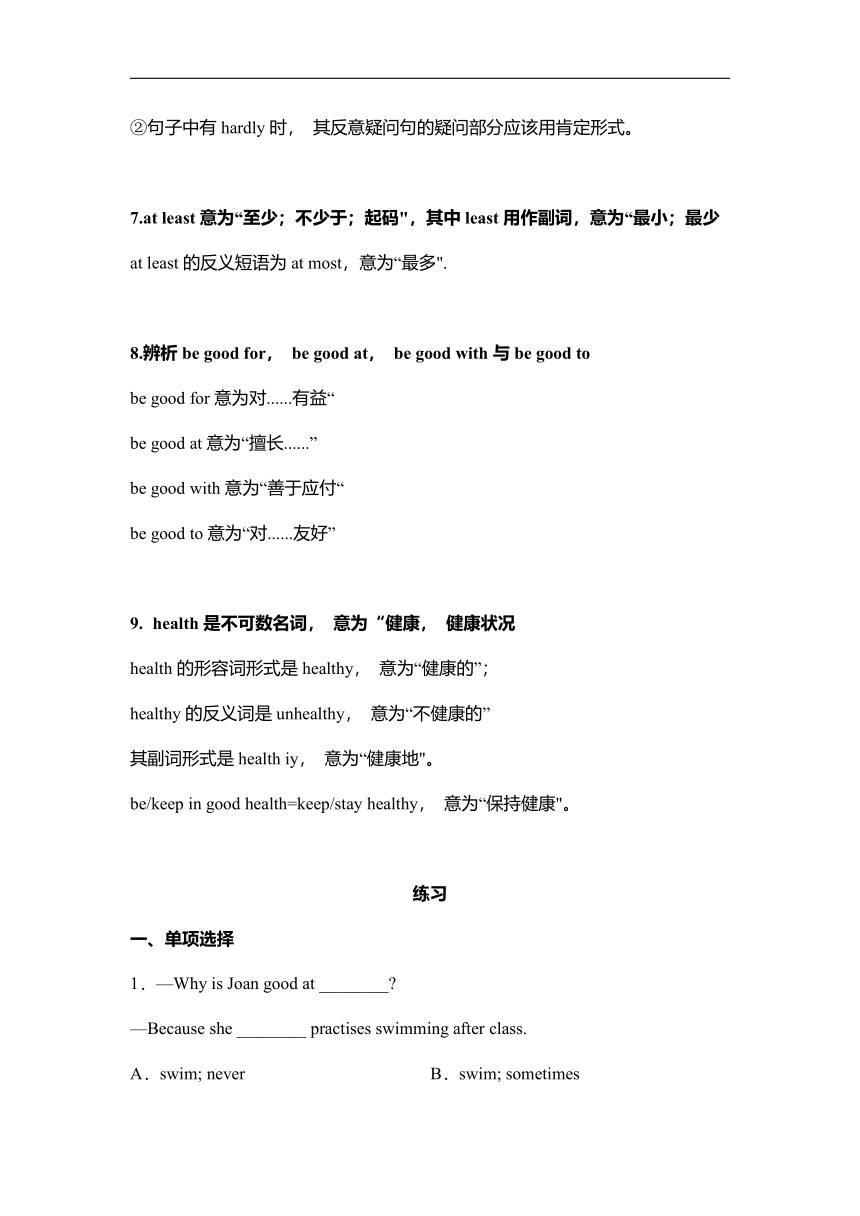
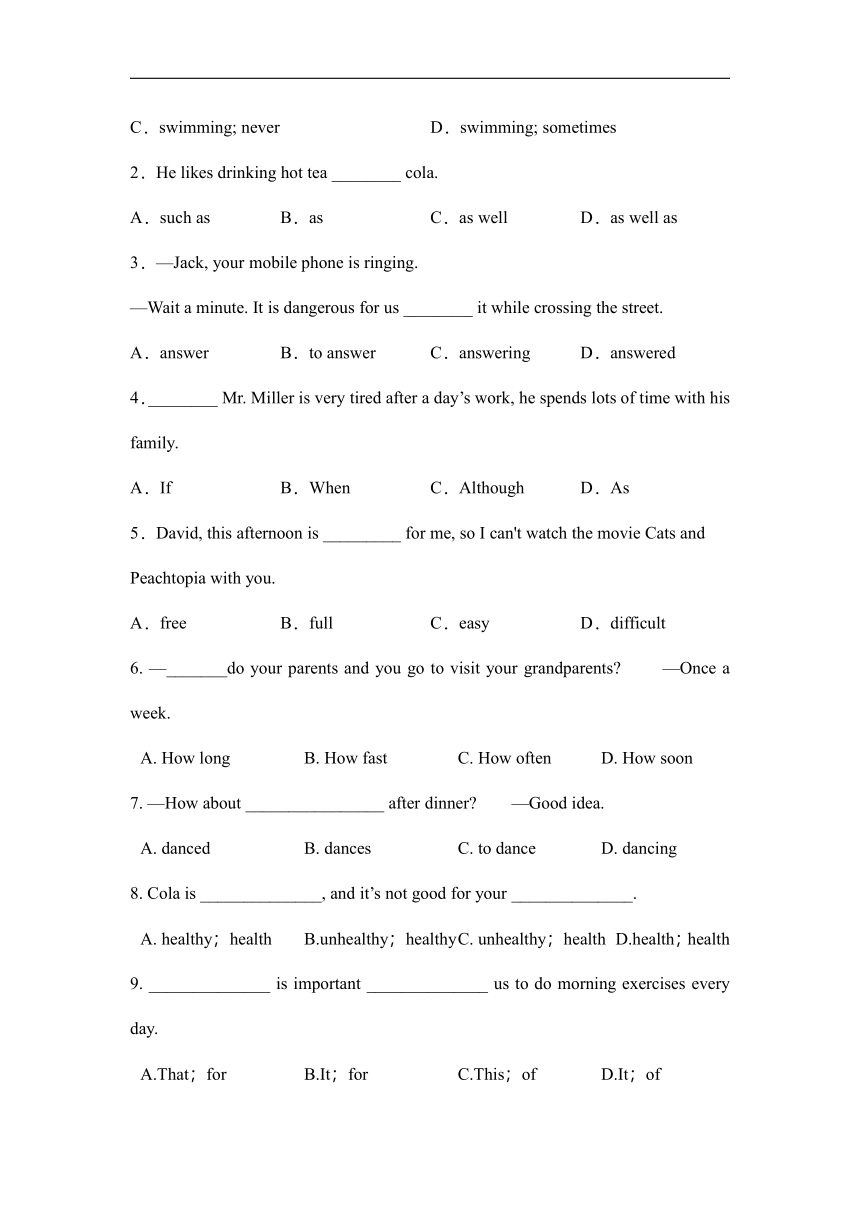
文档简介
人教版八年级上 unit 2
一、单词英译汉
1. housework /'ha sw :(r)k/ _________
2. hardly /'hɑ:(r)dli/ _____________
3. ever /'ev (r)/ ____________________
4. once /w ns/ ____________________
5. twice /twa s/ ____________________
6. Internet /' nt (r)net/ ____________
7. program /'pr ɡr m/ ___________
8. full /f l/ ____________________
9. swing /sw / ____________________
10. maybe /'me bi/ _____________
11. least /li:st/ ____________________
12. junk /d nk/ _______________
13. coffee /'k fi/, /'k :fi/ __________
14. health /helθ/ ___________
15. result /r 'z lt/ ____________
16. percent /p (r)'sent/ ___________
17. online / n'la n/, / ɑ:n'la n/ _______
18. television /'tel v n/ ____________
19. although / :l' / ___________
20. through /θru / ____________
二、短语
1. how often 多久一次
2. once a month 一月一次
3. once every two weeks 每两周一次
4. help with/(to) do housework 帮助做家务
5. think twice 再三考虑
6. hardly ever 几乎不
7. my favorite program 我最喜欢的节目
8. surf/ use the Internet 上网
9. be free = have (free) time 有空
10. how come 怎么会
11. be full of 充满 = be filled with
12. what kind of dance 那种舞蹈
13. swing dance 摇摆舞
14. stay up late to do sth 熬夜做某事
15. at least/ at most 至少/至多
16. eat a healthy breakfast 吃一顿健康的早餐
17. go to bed early 早早睡觉
18. take notes in English class 上课记笔记
19. listen to English songs 听英语歌
20. review notes 复习笔记
重点知识点汇总
辦析sometimes, sometime, sometimes与some tine
(1) Sometimes有时 表示动作发生的不经常性,多与一般现在时连用,可位于句首、句中或句末
(2) sometime在某一时刻, 在某时 表示某个不确切或不具体的时间, 常用于过去时或将来时, 对它提问用when
(3) sometimes几次; 几倍 其中time是可数名词, 对它提问用how many times
(4) sometime一段时间表示”一段时间” 对它提问用how long
辨析how often, how long, how far与how soon
how often多久一次用来提问动作发生的频率
how long多长用来询问时间的长短;也可询问某物的长度
how far多远用来询问距离,指路程的远近
how soon多久以后用来对“in+一段时间”提问
3. 辨析use, with与in
use动词在句中作谓语,表示用途
with介词在句中作状语,表示方式, 指“用(工具等)
in介词在句中作状语,表示方式,指“用(语言、声音、材料等)”
4.How come 为什么
How come 是英语口语中的常用语, 相当于“为什么 /怎么会呢 ".
可以单独使用,也可以在其后接句子,用来询问事情的缘由。
5.辨析maybe与maybe
maybe副词,作状语,意为“或许;大概;可能”,相当于perhaps
maybe属于“情态动词+动词原形“结构,作谓语,意为“可能是;也许是”
6.hardly ever 意为“几乎从不”,表示频率.
①hardly常位于实意动词之前, 连系动词、助动词或情态动词之后, 本身具有否定意味,不可再用否定词。
②句子中有hardly时, 其反意疑问句的疑问部分应该用肯定形式。
7.at least意为“至少;不少于;起码",其中least用作副词,意为“最小;最少
at least的反义短语为at most,意为“最多".
8.辨析be good for, be good at, be good with与be good to
be good for意为对......有益“
be good at意为“擅长......”
be good with意为“善于应付“
be good to意为“对......友好”
health是不可数名词, 意为“健康, 健康状况
health的形容词形式是healthy, 意为“健康的”;
healthy的反义词是unhealthy, 意为“不健康的”
其副词形式是health iy, 意为“健康地"。
be/keep in good health=keep/stay healthy, 意为“保持健康"。
练习
一、单项选择
1.—Why is Joan good at ________
—Because she ________ practises swimming after class.
A.swim; never B.swim; sometimes
C.swimming; never D.swimming; sometimes
2.He likes drinking hot tea ________ cola.
A.such as B.as C.as well D.as well as
3.—Jack, your mobile phone is ringing.
—Wait a minute. It is dangerous for us ________ it while crossing the street.
A.answer B.to answer C.answering D.answered
4.________ Mr. Miller is very tired after a day’s work, he spends lots of time with his family.
A.If B.When C.Although D.As
5.David, this afternoon is _________ for me, so I can't watch the movie Cats and Peachtopia with you.
A.free B.full C.easy D.difficult
6. —_______do your parents and you go to visit your grandparents —Once a week.
A. How long B. How fast C. How often D. How soon
7. —How about ________________ after dinner —Good idea.
A. danced B. dances C. to dance D. dancing
8. Cola is ______________, and it’s not good for your ______________.
A. healthy;health B.unhealthy;healthy C. unhealthy;health D.health;health
9. ______________ is important ______________ us to do morning exercises every day.
A.That;for B.It;for C.This;of D.It;of
10. —How many hours do you play computer games every week
—______________. My mother doesn’t allow me to do that at all.
Both B. Either C. All D. None
答案 DDBCB CDCBD
二、完型
When I was a little girl, my father loved to play catch with me. The game is 1 . One person throw the ball, and the other try to catch it. I was not good at catching, but he would encourage me. He 2 told me “keep your eye on the ball” when I couldn’t catch the throws.
As I got older, we didn’t play catch. If I had a problem, I would go to my father to ask for his 3 He would try to joke with me and say “keep your eye on the ball”. We would both 4 when hearing that. The words made both of us 5 the happy old days. Though his words couldn’t really help me solve the problem, I felt much more 6 and didn’t worry any more.
7 , my father became ill in 1995 when I was 23. As he suffered from a stroke, he could not 8 . There were no more talks between us. He could only mouth the words, which were sometimes hard to understand. After a while, I seemed to be pretty good at reading his lips (嘴唇), even better than the nurses who 9 him.
During our last conversation, I was telling him about a (n) 10 I was having with my work. Once again, I could read his lips: “Keep your eye on the ball.” We both smiled.
That was the last time I saw my father before he passed away. Since then, “keep your eye on the ball” has become a way for me to get rid of stress.
1.A.special B.easy C.scary D.useful
2.A.always B.never C.hardly D.seldom
3.A.if B.difference C.idea D.message
4.A.by B.sleep C.laugh D.fight
5.A.think of B.wait for C.listen to D.put up
6.A.bored B.tired C.interested D.relaxed
7.A.Sadly B.Luckily C.Happily D.Lazily
8.A.see B.speak C.smell D.hear
9.A.looked at B.played with C.cared for D.heard from
10.A.crime B.exercise C.answer D.Problem
答案 BACCA DABCD
三、词语运用
People in the UK spend their free time in different ways. They ____1____ (usual) use it to relax. They spend a lot ____2____ their free time at home. The most popular activity is ____3____ (watch) TV. People in the UK watch TV for about 25 hours a week. They often record(录制)programs, ____4____ they can watch them later. Reading is ____5____ a popular way of ____6____ (spend) free time. People in the UK spend a lot of time reading newspapers ____7____ magazines. Many people in the UK have pets. They like playing ____8____ their pets in their free time.
____9____ the weekend, people in the UK like to spend their free time doing sports. The popular kinds of sports are soccer, horse racing, swimming, tennis, skating, climbing and ____10____ (hill) walking.
答案
1.usually
2.of
3.watching
4.so
5.also
6.spending
7. and
8. with
9.On
10. hill
四、根据汉语意思完成句子
1.他喜欢各种各样的水果,例如苹果、香蕉和橘子。
He likes different kinds of fruits, ______ ______ apples, bananas and oranges.
2.弗兰克每周看三四次电视。
Frank watches TV ______ ______ ______ a week.
3.这个十岁的男孩每天都帮助做家务。
The ______ boy ______ ______ housework every day.
4.昨天他根本没有做家庭作业。
He ______ ______ his homework ______ ______yesterday.
5.你的妈妈多久购物一次?
______ ______ does your mother______ ______
6. 因为做家务,她没有看她最爱的电视节目。
She didn’t watch her favorite TV program______________________ housework.
我妈妈几乎从来不熬夜。
My mother_______________________________________________.
8. 我们应该把时间花在其他事情上,比如说学习。
We should spend our time on other things____________________________ study.
9.我比你快乐,因为我担心的事情比你少。
I’m happier than you because I care_____________________ you.
10.托尼至少一年看两次牙医。
Tony goes to the dentist_____________________________ twice a year.
答案
1.such as
2.three or four
3.10-year-old helps do
4.didn’t do at all
5.How often go shopping
6.because of doing
7.hardly ever stay up late
8.such as
9.less than
10.at least
五、句型转换
1.Maybe you are right. (改为同义句)
You ________ ________ right.
2.He doesn’t often go to the cinema with us. (改为同义句)
He ________ ________ to the cinema with us.
3.There are over 2,000 books in our school library.(同义句)
There are ________ ________ 2,000 books in our school library.
4.There are over two thousand people in the big hall. (改为同义句. )
There are ________ ________ two thousand people in the big hall.
5.Mary is 16 years old.(改为同义句)
Mary is________ ________ girl.
may be
never goes
more than
more than
a 16-year-old
一、单词英译汉
1. housework /'ha sw :(r)k/ _________
2. hardly /'hɑ:(r)dli/ _____________
3. ever /'ev (r)/ ____________________
4. once /w ns/ ____________________
5. twice /twa s/ ____________________
6. Internet /' nt (r)net/ ____________
7. program /'pr ɡr m/ ___________
8. full /f l/ ____________________
9. swing /sw / ____________________
10. maybe /'me bi/ _____________
11. least /li:st/ ____________________
12. junk /d nk/ _______________
13. coffee /'k fi/, /'k :fi/ __________
14. health /helθ/ ___________
15. result /r 'z lt/ ____________
16. percent /p (r)'sent/ ___________
17. online / n'la n/, / ɑ:n'la n/ _______
18. television /'tel v n/ ____________
19. although / :l' / ___________
20. through /θru / ____________
二、短语
1. how often 多久一次
2. once a month 一月一次
3. once every two weeks 每两周一次
4. help with/(to) do housework 帮助做家务
5. think twice 再三考虑
6. hardly ever 几乎不
7. my favorite program 我最喜欢的节目
8. surf/ use the Internet 上网
9. be free = have (free) time 有空
10. how come 怎么会
11. be full of 充满 = be filled with
12. what kind of dance 那种舞蹈
13. swing dance 摇摆舞
14. stay up late to do sth 熬夜做某事
15. at least/ at most 至少/至多
16. eat a healthy breakfast 吃一顿健康的早餐
17. go to bed early 早早睡觉
18. take notes in English class 上课记笔记
19. listen to English songs 听英语歌
20. review notes 复习笔记
重点知识点汇总
辦析sometimes, sometime, sometimes与some tine
(1) Sometimes有时 表示动作发生的不经常性,多与一般现在时连用,可位于句首、句中或句末
(2) sometime在某一时刻, 在某时 表示某个不确切或不具体的时间, 常用于过去时或将来时, 对它提问用when
(3) sometimes几次; 几倍 其中time是可数名词, 对它提问用how many times
(4) sometime一段时间表示”一段时间” 对它提问用how long
辨析how often, how long, how far与how soon
how often多久一次用来提问动作发生的频率
how long多长用来询问时间的长短;也可询问某物的长度
how far多远用来询问距离,指路程的远近
how soon多久以后用来对“in+一段时间”提问
3. 辨析use, with与in
use动词在句中作谓语,表示用途
with介词在句中作状语,表示方式, 指“用(工具等)
in介词在句中作状语,表示方式,指“用(语言、声音、材料等)”
4.How come 为什么
How come 是英语口语中的常用语, 相当于“为什么 /怎么会呢 ".
可以单独使用,也可以在其后接句子,用来询问事情的缘由。
5.辨析maybe与maybe
maybe副词,作状语,意为“或许;大概;可能”,相当于perhaps
maybe属于“情态动词+动词原形“结构,作谓语,意为“可能是;也许是”
6.hardly ever 意为“几乎从不”,表示频率.
①hardly常位于实意动词之前, 连系动词、助动词或情态动词之后, 本身具有否定意味,不可再用否定词。
②句子中有hardly时, 其反意疑问句的疑问部分应该用肯定形式。
7.at least意为“至少;不少于;起码",其中least用作副词,意为“最小;最少
at least的反义短语为at most,意为“最多".
8.辨析be good for, be good at, be good with与be good to
be good for意为对......有益“
be good at意为“擅长......”
be good with意为“善于应付“
be good to意为“对......友好”
health是不可数名词, 意为“健康, 健康状况
health的形容词形式是healthy, 意为“健康的”;
healthy的反义词是unhealthy, 意为“不健康的”
其副词形式是health iy, 意为“健康地"。
be/keep in good health=keep/stay healthy, 意为“保持健康"。
练习
一、单项选择
1.—Why is Joan good at ________
—Because she ________ practises swimming after class.
A.swim; never B.swim; sometimes
C.swimming; never D.swimming; sometimes
2.He likes drinking hot tea ________ cola.
A.such as B.as C.as well D.as well as
3.—Jack, your mobile phone is ringing.
—Wait a minute. It is dangerous for us ________ it while crossing the street.
A.answer B.to answer C.answering D.answered
4.________ Mr. Miller is very tired after a day’s work, he spends lots of time with his family.
A.If B.When C.Although D.As
5.David, this afternoon is _________ for me, so I can't watch the movie Cats and Peachtopia with you.
A.free B.full C.easy D.difficult
6. —_______do your parents and you go to visit your grandparents —Once a week.
A. How long B. How fast C. How often D. How soon
7. —How about ________________ after dinner —Good idea.
A. danced B. dances C. to dance D. dancing
8. Cola is ______________, and it’s not good for your ______________.
A. healthy;health B.unhealthy;healthy C. unhealthy;health D.health;health
9. ______________ is important ______________ us to do morning exercises every day.
A.That;for B.It;for C.This;of D.It;of
10. —How many hours do you play computer games every week
—______________. My mother doesn’t allow me to do that at all.
Both B. Either C. All D. None
答案 DDBCB CDCBD
二、完型
When I was a little girl, my father loved to play catch with me. The game is 1 . One person throw the ball, and the other try to catch it. I was not good at catching, but he would encourage me. He 2 told me “keep your eye on the ball” when I couldn’t catch the throws.
As I got older, we didn’t play catch. If I had a problem, I would go to my father to ask for his 3 He would try to joke with me and say “keep your eye on the ball”. We would both 4 when hearing that. The words made both of us 5 the happy old days. Though his words couldn’t really help me solve the problem, I felt much more 6 and didn’t worry any more.
7 , my father became ill in 1995 when I was 23. As he suffered from a stroke, he could not 8 . There were no more talks between us. He could only mouth the words, which were sometimes hard to understand. After a while, I seemed to be pretty good at reading his lips (嘴唇), even better than the nurses who 9 him.
During our last conversation, I was telling him about a (n) 10 I was having with my work. Once again, I could read his lips: “Keep your eye on the ball.” We both smiled.
That was the last time I saw my father before he passed away. Since then, “keep your eye on the ball” has become a way for me to get rid of stress.
1.A.special B.easy C.scary D.useful
2.A.always B.never C.hardly D.seldom
3.A.if B.difference C.idea D.message
4.A.by B.sleep C.laugh D.fight
5.A.think of B.wait for C.listen to D.put up
6.A.bored B.tired C.interested D.relaxed
7.A.Sadly B.Luckily C.Happily D.Lazily
8.A.see B.speak C.smell D.hear
9.A.looked at B.played with C.cared for D.heard from
10.A.crime B.exercise C.answer D.Problem
答案 BACCA DABCD
三、词语运用
People in the UK spend their free time in different ways. They ____1____ (usual) use it to relax. They spend a lot ____2____ their free time at home. The most popular activity is ____3____ (watch) TV. People in the UK watch TV for about 25 hours a week. They often record(录制)programs, ____4____ they can watch them later. Reading is ____5____ a popular way of ____6____ (spend) free time. People in the UK spend a lot of time reading newspapers ____7____ magazines. Many people in the UK have pets. They like playing ____8____ their pets in their free time.
____9____ the weekend, people in the UK like to spend their free time doing sports. The popular kinds of sports are soccer, horse racing, swimming, tennis, skating, climbing and ____10____ (hill) walking.
答案
1.usually
2.of
3.watching
4.so
5.also
6.spending
7. and
8. with
9.On
10. hill
四、根据汉语意思完成句子
1.他喜欢各种各样的水果,例如苹果、香蕉和橘子。
He likes different kinds of fruits, ______ ______ apples, bananas and oranges.
2.弗兰克每周看三四次电视。
Frank watches TV ______ ______ ______ a week.
3.这个十岁的男孩每天都帮助做家务。
The ______ boy ______ ______ housework every day.
4.昨天他根本没有做家庭作业。
He ______ ______ his homework ______ ______yesterday.
5.你的妈妈多久购物一次?
______ ______ does your mother______ ______
6. 因为做家务,她没有看她最爱的电视节目。
She didn’t watch her favorite TV program______________________ housework.
我妈妈几乎从来不熬夜。
My mother_______________________________________________.
8. 我们应该把时间花在其他事情上,比如说学习。
We should spend our time on other things____________________________ study.
9.我比你快乐,因为我担心的事情比你少。
I’m happier than you because I care_____________________ you.
10.托尼至少一年看两次牙医。
Tony goes to the dentist_____________________________ twice a year.
答案
1.such as
2.three or four
3.10-year-old helps do
4.didn’t do at all
5.How often go shopping
6.because of doing
7.hardly ever stay up late
8.such as
9.less than
10.at least
五、句型转换
1.Maybe you are right. (改为同义句)
You ________ ________ right.
2.He doesn’t often go to the cinema with us. (改为同义句)
He ________ ________ to the cinema with us.
3.There are over 2,000 books in our school library.(同义句)
There are ________ ________ 2,000 books in our school library.
4.There are over two thousand people in the big hall. (改为同义句. )
There are ________ ________ two thousand people in the big hall.
5.Mary is 16 years old.(改为同义句)
Mary is________ ________ girl.
may be
never goes
more than
more than
a 16-year-old
同课章节目录
- Unit 1 Where did you go on vacation?
- Section A
- Section B
- Unit 2 How often do you exercise?
- Section A
- Section B
- Unit 3 I'm more outgoing than my sister.
- Section A
- Section B
- Unit 4 What's the best movie theater?
- Section A
- Section B
- Unit 5 Do you want to watch a game show?
- Section A
- Section B
- Unit 6 I'm going to study computer science.
- Section A
- Section B
- Unit 7 Will people have robots?
- Section A
- Section B
- Unit 8 How do you make a banana milk shake?
- Section A
- Section B
- Unit 9 Can you come to my party?
- Section A
- Section B
- Unit 10 If you go to the party, you'll have a grea
- Section A
- Section B
